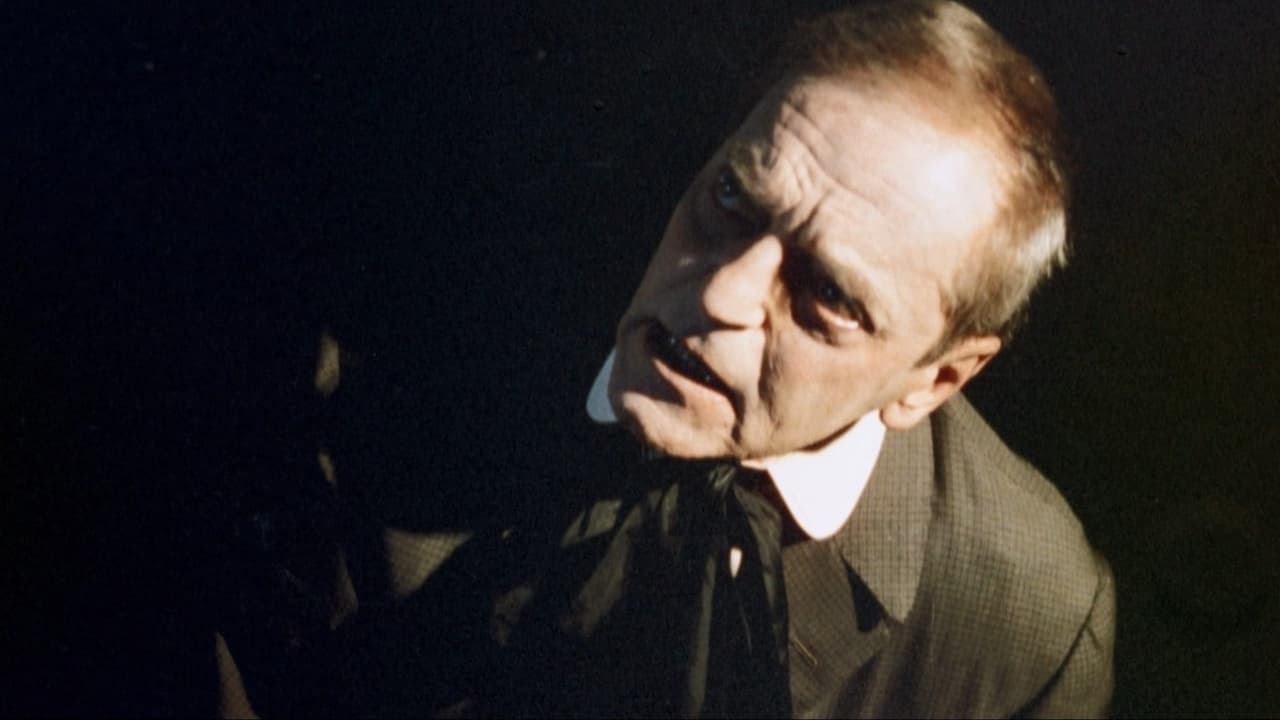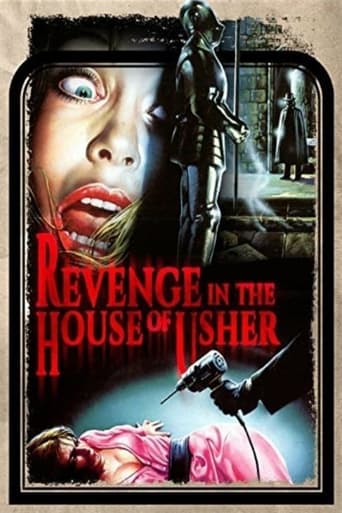

Strictly average movie
... View MoreReally Surprised!
... View MoreFanciful, disturbing, and wildly original, it announces the arrival of a fresh, bold voice in American cinema.
... View MoreA terrific literary drama and character piece that shows how the process of creating art can be seen differently by those doing it and those looking at it from the outside.
... View MorePicked this up, being a Jess Franco fan, but was somewhat surprised by the BBFC 12 rating. Surely not?? A Franco horror film without lashings of gore and nudity?? Well yes, actually. So straightaway it's very tame by his usual standard. The film is also slow, dull and looks badly acted, though that could be down to the atrocious dubbing on the English language version. On the plus side it is pretty creepy, filmed in an old castle in the mountains and does have his wife Lina Romay in it, though amazingly she is fully clothed throughout. Worth ticking off for Francophiles, otherwise avoid like the plague!
... View MoreApparently there are several versions of this Jess Franco directed project. This appears to be the French version, dubbed into English, and featuring 'The Living Dead Girl' herself, Françoise Blanchard (as Melissa). Amidst the candle-lit wailings, darkened, crumbling passages and overwhelming architecture are Franco veterans Lina Romay (the housekeeper, Maria) and Howard Vernon (Eric Vladimir Usher).Whilst clearly out of the hands of Franco, it has to be noted the dubbing for this is pretty appalling. Whether the voice artists are actors at all, is debatable – the exception is Usher's voice-over, which sounds like an impression of James Mason.The story, twisting and meandering and far too thin, involves Doctor Alan Harker (echoes of Dracula? There is also a Doctor Seward, who has in times gone by – played by a different actor – featured with Dracula, Frankenstein's Monster and fleetingly, a werewolf under Franco's direction) who visits the house/castle of his former Professor Usher. Usher is clearly insane and looked after by his housekeeper. His daughter (Blanchard) died years before, but can apparently be reanimated by the blood of prostitutes, who are kept imprisoned within the castle.Despite the effective (and beautifully shot) locale, this is clearly one of the less budgeted Franco productions. Whether an artistic decision or a financial one, there is a lot of stock-footage from the earlier, far more acclaimed 'The Awful Doctor Orloff (1962)'. There is far too much of this, although these flashbacks are far superior to the film they are supporting. Although it features a younger Vernon as Orloff/Usher, the actress playing Melissa is noticeably different. The story of Orloff has been changed to fit the narrative of 'Revenge in the House of Usher.' When this was released, audiences weren't as privy to recordings of earlier films as we are these days, so the use of such footage is possibly justified. Seen now though, it seems like a way of backing up a weak story and padding out the running time. As a result, this is a patchwork affair. It isn't, as has been suggested, Franco's worst production – the locations alone are incredibly atmospheric and really promotes Usher's magnificent isolation, as does the minimalist soundtrack. And yet whilst saturating the viewer in its macabre mood-scapes, it remains an often ponderous exercise, with Franco's two trademarks – sex and gore – almost entirely absent.
... View MoreA traveler arrives at the Usher mansion to find that the sibling inhabitants are living under a mysterious family curse: The brother's senses have become painfully acute, while his sister has become nearly catatonic.Why has this film been given the new name of "Zombie 5"? I mean, sure, it is a stretch to say it is based on Poe's "House of Usher", but it is an even bigger stretch to try to say this somehow fits in the Italian "Zombie" franchise... not even close.People seem to hate this film, and I can see why. The effects are terrible: the poor use of a spotlight to simulate a hand-held light, the strange eyeball. One reviewer said they fell asleep twice in the first fifteen minutes. I did not find it nearly all that bad. Cheesy, sure, A bit weak on plot, certainly. But I have seen a lot worse than this, even from Jess Franco.
... View More"Revenge in the House of Usher" is said to be one of Jess Franco's worst film. However, this happens to be one of my favorite works of the celebrated director (well, depending on the cut, that is), and while it will not appeal to everyone, fans of European haunted house films like "Lisa and the Devil" and Franco's own "A Virgin Among the Living Dead" will find plenty to enjoy here. Incidentally, one of the reasons why people hate it so much (or so I think), also plagued the other two films, as the most common version is in fact a butchered recut. Originally released in Spain as "El Hundimiento de la Casa Usher", the film flopped and only resurfaced when Eurocine got it's hands on it, removing some of the original's most startling sequences and substituting them with an new subplot to cash in on the success of Franco's "Dr. Orloff" films, and even adding scenes from "The Awful Dr. Orloff" poorly edited into the mix as flashbacks. To it's credit, this new cut actually does a good job with the new footage, as they are quite atmospheric and interesting, and one can see they actually made an effort for it to look like it belongs to the same film but get tend dull and repetitive after a while. Now, back to "El Hundimiento...", Franco doesn't go for a straight adaptation of the story even though it does have a similar premise and climax. It's faithfulness lies at recreating the themes and mood of Poe's work, taking elements from more than one of his stories ("Ligeia" in particular is referenced throughout) to create something more unique. For my money, this film – along with Jean Epstein's superb 1928 take on the same story – is the one that actually comes closest to achieve that decadent atmosphere of morbid romance. The Spanish deserts may not be one's ideal location for the house, but here it actually works a lot, and remains close to Poe's description of it although in a rather unconventional matter. The never-ending daylight, a Franco trademark, is used to great effect too, creating a suffocating, feverish atmosphere throughout (also giving the idea that Usher's delusions may have something to do with that oppressive sun). The castle itself is absolutely stunning and is beautifully photographed. The use of shadows and natural light during the interior sequences is excellent, proving once again that Franco always has a great eye for shooting on locations. There are plenty of gorgeous, darkly Gothic compositions throughout, with the architecture always playing an important part. One of the most compelling aspects of this production is that Franco is aiming for a kind of 20's/30's Gothic . Compared to genre works of the same kind made during that period, it may feel helplessly outdated, but that's part of the charm. Unlike what some have grown to expect from him, there is no on screen sex and nudity, with most of the "dirty" stuff implied, which I personally feel is a wise move and works in a Val Lewton kind of way. Everything from the script and particularly Daniel White's non-stop melodramatic score just screams old-school, expressionistic horror. Although these scenes were added in under producer's insistence, some of the film's most interesting additions is that Usher may or may not be be a vampire serial killer. It isn't clear whether these killings actually took place, but they are truly powerful moments. The build-up for the first death scene is particularly incredible, with great use of expressionistic lighting, and the conversation between prey and attacker. The most downright disturbing murder is that of a little girl. The scene itself is already creepy with it's open suggestion of pedophilia, but having him actually kill her and feast on her blood on screen makes it quite difficult to watch. Howard Vernon's totally demented performance also helps in making this bit particularly convincing, as he really does seem to enjoy doing it. Speaking of Vernon, I must say this is his most impressive performance under Franco's direction. He is mostly lonely, introspective and melancholy, occasionally turning (sometimes in the same scene) gleefully over-the-top and hysterical; and also quite monstrous and downright scary. Although Mayans is sadly unimpressive and dull as the narrator/protagonist Harker; Lina Romay more than makes up for it as the servant Helen. Despite the absence of her usual masturbatory fits, Romay's acting is actually one of her all time best, serving as a kind of dead ringer for Helena Boham Carter in Tim Burton's "Sweeney Todd". In fact, I find her even more sexy with her clothes on, playfully seducing on the members of the household and oozing a sleazy, "femme-fatale" like charm. She also delivers some of the best lines, as well as the film's few moments of dark humor. Although I can't find her name in the credits list, the actress who plays the ghostly Edmunda deserves special mention as well. From her frightening introduction in a "Kill Baby Kill" inspired scene, she has a strong, ethereal quality on her. As for flaws, the film moves at a very slow pace (it worked for me, but I can definitely see why some can call it boring), and with a rather stiff protagonist. Also, this is a very low budget production, and it shows. The climax in particular suffers from the poor production values, with a very unconvincing "fall". The scene is made up basically from shaky camera angles and falling furniture. Still, this happens right after one of the film's most memorable sequence: Usher's encounter with his victims' vengeful ghosts, which may just be the most powerful moment in the film, akin to the powerful, haunting finale of "A Virgin Among the Living Dead". As a whole, "House of Usher" may not convince Franco bashers of the man's talents, but for more seasoned fans of the director and low-budget Eurohorror in general it is essential viewing.
... View More